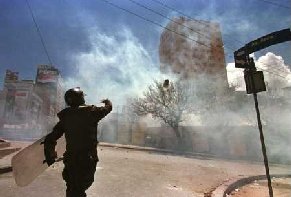As school teachers, doctors and postal workers went ahead with a 24-hour strike Friday, the government signaled it might be flexible about its 90-day state of emergency declared six days ago.
Most of the country returned to calm after protests Thursday and therefore the government "is open to the possibility of being more flexible" about the state of emergency, said Franz Ordanza, minister for the presidency, ahead of a cabinet meeting.
The state of emergency, as applied in the capital, prohibits "demonstrations, strikes, blockades or any public event." It also forbids groups of more than three people from moving through the city between 3:00 a.m. (0700 GMT) and 6.00 a.m. (1000 GMT).
The government's emergency declaration Saturday came as a response to protests against new water charges in the central Bolivian city of Cochabamba last week and highway blockades by farmers' unions elsewhere.
It allowed the government to send the army onto the streets to clear blockades and to detain trade union leaders, who were forcibly transferred to San Joaquin, a small town in the Amazon region some 600 kilometers (370 miles) northeast of here.
Over the past week the state of emergency has in itself become the main focus of discontent, prompting protests which have left six people dead, 91 injured and 92 detained, including 20 at San Joaquin.
However, Government Minister Walter Guiteras told newspapers here Thursday that the government was about to free eight of the 20 detained leaders — rural teachers' leader Fredd Nunez and seven water workers' leaders detained in Cochabamba Saturday.
The continued detention of Felipe Quispe, who heads the main Bolivian Rural Workers' Union (CSUTB), was still the subject of negotiation Friday between the government and the union.
A 24-hour strike by schoolteachers, doctors and postal workers in protest to the state of emergency and the detentions proceeded Friday amid calm.
Teachers' union leader Wilma Plata said announced a demonstration for later Friday, which she said would also include university students.
Scuffles Wednesday between police and students at La Paz' San Andres university left 28 students injured, two of them seriously, doctor Antonio Miranda at the university medical center said. Thirty-two students were arrested.
Except outside teachers' union headquarters, the level of policing in the capital was not beyond the usual level Friday. There were some police checkpoints on roads leading into the capital, and the city's international airport was functioning normally.
